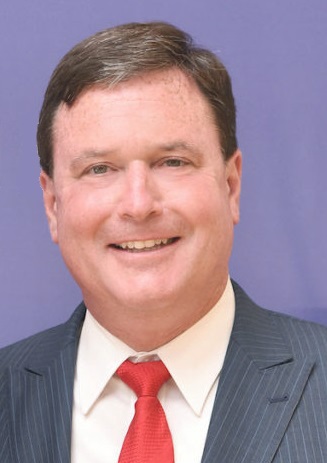
By Becky Killian, Staff Writer
By Becky Killian, Staff Writer
After months of study, the three citizen members of “Task Force Clean Water” delivered their final report to Salem officials only to have it countered with a separate report by the two elected officials who served alongside them.The reports were delivered during the Monday, Aug. 12, meetings of the Salem Board of Public Works and Safety and the Salem Common Council.
The task force’s original intention – as was outlined in an ordinance drafted and proposed by Councilman Roger Pennington in a surprise move in March – was to deliver one report; however, Pennington claimed the three citizens pushed the South Main waterline replacement project ahead of planned state repaving from the start of their meetings, calling their actions “a one trick pony.”
The citizen members were Tom Jacobs, Becky Dewees, and Jason Cockerill.In addition to Pennington, Councilman Dylan Moore was the other elected official on the five-member task force.
Jacobs delivered the citizens’ report, which was based on visits to Salem’s water utility, as well as utilities in Scottsburg and Georgetown. They also researched records and best practices.
“We did not find any instance of what we would consider gross waste or mismanagement,” Jacobs said of the city’s water utility.
The report states, “Local site visits at Salem found a well-run operation with highly competent and enthusiastic staff along with sound compliance to all known regulations as the water task force understood them to be.”
The citizens’ report indicates that an ongoing reluctance by city officials to raise rates to adequately cover the water utility’s expenses has put the city at odds with a state law that requires these utilities to collect rates that provide “an income sufficient to maintain the utility property in a sound and financial condition to render adequate and efficient services. Rates and charges too low to meet these requirements are unlawful.”
“Under the current rate structure, the water department lives ‘hand to mouth’ month-to-month and does not have an adequate reserve fund at this time to address capital issues such as the waterline replacement project on South Main Street,” the report indicates.
The lack of reserve cash has cost the city more money, with the report stating that a solar panel project was shelved when officials realized it would require a rate increase to pay for the panels that would have eventually resulted in a cost savings. It notes that 93 percent of the city’s electrical usage is consumed by the water utility and the solid waste treatment plant.
The report also criticizes the council for passing up the opportunity to get a $3.3 million bond at 2 percent interest to pay for the South Main waterline replacement project. Two votes were held on the bond issue, with the first happening on Feb. 12, when Pennington, Moore, and Randy Lee voted against it. Those three also cast opposing votes at a subsequent meeting on Feb. 26, when they were joined by Councilman Steve Crane.
“Current circumstances clearly indicate that the decision to table the bond issues was a significant and costly mistake that should be rectified as quickly as possible,” the report states.
The report includes details of a water main rupture in Bedford that happened after a street was repaved. The rupture buckled the newly poured street and forced the city to pursue a $2 million grant to cover the cost of the emergency repairs.
“We most strongly recommend that the elected members of the council rethink their position on the bond,” Jacobs said.
The citizens’ report was followed by the report from Pennington and Moore.
Pennington questioned whether the utility is in dire financial straits. He said the city pays too much for sludge hauling and chemicals, saying the cost increases can’t all be explained by inflation. He also criticized the city for hiring Wessler Engineering – a firm hired by governmental entities across the state – rather than hiring its own full-time certified engineer. He noted the city has paid $3.93 million to the firm in the past seven years.
The bulk of the utility’s water sales, or 54 percent, is to distributors East Washington and New Pekin, Pennington said. Twenty-six percent of the sales are to residential users. The city is projected to have a declining population in coming years that will reduce water demand by about three percent, which Pennington said makes it urgent for the city to push industrial growth to cover that customer loss.
To attract industry, Pennington wants to tap into Lake Salinda as a secondary water source, calling it a “tremendous resource.”
Pennington concluded that the water utility has been “mismanaged,” with late reports resulting in fines, a failure to plan, to seek grant opportunities, and to seek bids for chemicals, saying that failure “has cost a substantial amount of money.”
He said the city should hold rates and pursue cost cutting measures.
Jacobs asked to comment on Pennington's and Moore’s presentation, saying, “Mr. Pennington, I am confused. Of all the meetings we had never did you imply or state there was mismanagement at the water plant.”
The citizen members had provided a draft of their report with the intention of including any input – including dissenting opinions – from Pennington and Moore, Jacobs said.
Pennington said from the start of the task force’s meeting, he and Moore were criticized for their opposition to the bond issue.
Pennington proposed the formation of the task force in a surprise move in March when he presented the ordinance he wrote. That ordinance detailed the composition of the task force. One citizen member was chosen by Mayor Justin Green, and the other two applied for the post and were chosen by a majority vote by the council.
The stated purpose of the task force was to restore confidence in the city’s water utility.

Attorney General Todd Rokita’s office secured another win for medical privacy, ensuring through court-directed discovery that IU Health has proper privacy controls and training in place to protect Hoosier patients’ private health information.
IU Health management initially denied allegations that Dr. Caitlin Bernard violated a patient's privacy at a political rally.
IU Health officials even continued those denials after that same doctor's peers serving on the Indiana Medical Licensing Board found that she DID violate privacy laws. This repeated refusal by IU Health to even acknowledge a violation of patient privacy prompted the Office of Attorney General to probe whether and how IU Health was conducting patient privacy training in light of its mishandling of the Bernard matter.
When IU Health officials refused to answer questions, the Office of the Attorney General had no choice but to file a lawsuit to require their cooperation and answers.
“This is a win for patients, but also for the group's 36,000 health care providers who can now trust they've received accurate training that is consistent with HIPAA privacy laws and Indiana patient confidentiality rules,” Attorney General Rokita said. “One of my office’s main priorities is to protect patient privacy because when it’s not, we no longer have reliable, honest healthcare."
The Sept. 15, 2023, lawsuit was filed on behalf of the people of Indiana against IU Health and IU Healthcare Associates for their failure to properly report, review and enforce HIPAA and Indiana law violations. Attorney General Rokita and his team verified through discovery in this case that IU Health has now taken necessary actions to better train employees to help protect the medical privacy of Indiana residents.
Through this lawsuit, Attorney General Rokita’s office confirmed IU Health has undertaken the following actions:
- Trained employees to specifically avoid talking about patients in public areas;
- Informed its employees they are required to notify public relations staff prior to any communication so that management can verify patient authorization; and
- Conducted employee training on what constitutes Protected Health Information.
On June 30, 2022, Dr. Caitlin Bernard spoke with an Indy Star reporter at a political rally about her 10-year-old patient. IU Health later issued a media statement on July 13, 2022, that said Dr. Bernard had not violated privacy laws. After hearing over a dozen hours of testimony, the Indiana Medical Licensing Board, which is comprised of doctors, voted 5-1 that Dr. Bernard violated HIPPA. IU Health issued another statement on May 26, 2023, claiming it disagreed with the board’s decision and believed Dr. Bernard had not violated any privacy laws.
“IU Health rejected the best interest of patients and taxpayers alike when they set the tone by initially refusing to cooperate with our office,” Attorney General Rokita said. “We are pleased the information this office sought over two years ago has finally been provided and the necessary steps have been taken to accurately and consistently train their workforce to protect patients and their health care workers”.
Though voluntarily dismissing it without prejudice, Attorney General Rokita said they could always refile at a later date if necessary. As a government regulator responsible for HIPAA compliance, the State anticipates and expects hospitals and covered entities to continue significant and continual training to physicians and staff that addresses the importance of patient and data privacy.

Officials plan to dedicate a bridge in Salem to the county’s veterans. The joint effort between Salem and county officials was discussed during the Tuesday, Aug. 6, meeting of the Washington County Board of Commissioners.
The bridge, located along South Main Street near KFC, is currently unnamed. Andrew Bush, the county’s Veteran’s service officer, suggested it be named the “Washington County Veterans Memorial Bridge.”
Officials plan to hold a ceremony on Veterans Day, Monday, Nov. 11. Although the dedication will take place near the bridge, the ceremony will be held in conjunction with the usual observance held at the downtown courthouse.
Commission President Phillip Marshall asked Salem Mayor Justin Green if he would have the city’s fire department wash the bridge so the curbs can be painted prior to the ceremony.
Bush also told commissioners that some veterans’ grave markers have been damaged by mowing equipment. The county provides a one-time payment of $100 for the markers. Bush asked if that could be changed to allow for the replacement of the damaged markers.
Commissioner Todd Ewen suggested that Bush raise the matter during the County Council’s budget hearings, which will be held later this month. Ewen said Bush could add a line item to his budget that could be used to replace damaged markers.

Attorney General Todd Rokita and State Comptroller Elise Nieshallaare calling onIndiana University (IU) to show proof of compliancewith a clear and unambiguous statelaw,whichprohibits the Kinsey Institute fromusing taxpayer funds.
“My office works tirelessly to protectHoosiers’ hard-earnedtax dollars and Indianalaw is clear – no state funds may be used to fund theKinsey Institute,” Attorney General Rokita said.“More than a year has passed since IU assured the public and state officials that it would follow the law, yet we have seen no indication that any serious actions have been taken. IU is not above the law, and Hoosiers deserve answers.”
An Indiana lawpassed by the General Assembly prohibits state funding of the Kinsey Institute in any way. The 2023 law cites more than a dozen potential funding loopholes which must now operate using zero taxpayer dollars. A joint letter sent this weekby Attorney General Rokita and Comptroller Nieshallademands IU’s President and Trustees confirm compliance with thestate law that went into effect on July 1 – of last year – more than ample time to provide such proof.
“As the state elected leader responsible for the accounting and reporting of state funds, I take seriously my responsibility to document and provide complete transparency for tax dollars spent within state government,” stated Comptroller Elise Nieshalla. “With the absence of evidence per state law that tax dollars are no longer supporting the Kinsey Institute, we are calling for necessary financial information to prove adherence to state statute.”
Indiana University issued a press release in April of 2023promising a “thorough legal review to ensure the University follows state law.”But rather than show simple proof of compliance, the administrators of Indiana’s largest public university school systemvoted to tableandultimately declinedto separate the controversial sex research center from the University itself. Instead, IU proposed a plan to use accounting methods to ensure compliance, yet two quarterly meetings have passed since this proposal with no public update as to the implementation of an appropriateaccounting plan. Now, another semester is set to begin and Indiana taxpayers deserve answers.
The law passed by our General Assembly uses succinct language forbidding state funds frombeing used in the administration, operation, or any programs of the Kinsey Institute for Research in Sex, Gender, and Reproduction.
SalemLeader.com
Leader Publishing Company of Salem, Inc.
P.O. Box 506
117-119 East Walnut Street
Salem, Indiana. 47167
Phone: 812-883-3281 | Fax: 812-883-4446
Business Hours:
Mondays through Fridays, 9:00am - 5:00pm
News:
news@salemleader.com
Office:
office@salemleader.com
Publisher:
publisher@salemleader.com
Business
- More Business News
- Go To Guide
- Business Directory
- Auctions
Education
- More Education News
Opinion
- Editorials
- Letters to the Editor
- Columns
- Unsung Heroes
- Days Gone By
- In the Garden
- Guest Columns
- Reader's Poll
- Salem Leader Forum
- Questions and Answers
Church
- Bible Aerobics
- Church News
- Church Directory


